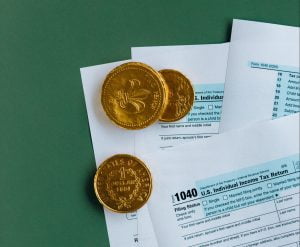By introducing a corporate tax, the United Arab Emirates (UAE)/Dubai reaffirmed its commitment to international standards of tax transparency and the prevention of harmful tax practices.
This corporate tax, which came into force on June 1, 2023, is governed by Federal Decree-Law No. 47 of 2022 on the Taxation of Corporations and Businesses (https://mof.gov.ae/wp-content/uploads/2022/12/Federal-Decree-Law-No.-47-of-2022-EN.pdf), (“Federal Decree-Law No. 47 of 2022“).
Taxable companies will now have to register for corporate tax (https://tax.gov.ae/en/services/corporate.tax.registration.aspx) and obtain a corporate tax registration number from the Federal Tax Authority, which is the competent authority for corporate tax matters.
The corporate tax return must be filed for each tax period within 9 months of the end of the tax period.
As regards the rate applicable to this new tax, taxable income over 375 000 AED will be taxed at a rate of 9%, while income below this threshold will be taxed at a rate of 0% (Article 3 of the law).
On reading this Federal Decree-Law No. 47 of 2022 (1.), we understand that its scope is quite wide without being absolute, which will have the effect of subjecting a certain number of people to the tax (1.a), while providing for exemptions under some conditions (1.b).
Furthermore, although taxable income (2.) is numerous, due to the duality of the criteria for determining such income(2.a), Federal Decree-Law No. 47 of 2022 provides for the deductibility of some expenses, which will have the effect of reducing taxation (2.b).
1.Scope of application of Federal Decree-law No. 47 of 2022

Although the law applies to a wide range of individuals and companies (a), its scope is not absolute, as exemptions are provided (b).
a.The principle: the subjection of legal entities and individuals whether or not resident operating in the UAE/Dubai
Article 11 of Federal Decree-Law No. 47 of 2022 lists persons subject to corporate tax.
Thus, the tax will apply to legal entities incorporated in the UAE and to legal entities effectively managed and controlled in the UAE, as well as to foreign legal entities with a permanent establishment in the UAE.
In this respect, the notice relating to this same law specifies that the definition of permanent establishment in the Federal Decree-Law was designed based on the definition provided in Article 5 of the OECD Model Tax Convention on Income and Capital, which allows us to refer to the OECD comments on this article to clearly define the outlines of the notion of permanent establishment.
The Federal Decree-law defines this notion as any business establishment or other form of presence of a non-resident person in the state.
In this respect, Article 11 of Federal Decree-law No. 47 of 2022 also defines the notions of resident and non-resident persons.
A resident person is defined as a legal entity incorporated or otherwise established or recognized under the applicable law of the state, including a person residing in a free trade zone, a legal entity incorporated or otherwise established or recognized under the applicable law of a foreign jurisdiction which is effectively managed and controlled in the state, a natural person who carries on a commercial or industrial activity in the State, or a person identified in a decision taken by the Cabinet on the proposal of the Minister.
A non-resident person is defined as a person who is not considered a resident person under the preceding paragraph, and who has a permanent establishment in the state, derives income from the state, or has a connection with the state as specified in a decision taken by the Cabinet on the proposal of the Minister.
It should be noted that the corporate tax law taxes income on the basis of both residence and source.
A resident person is taxed on income from both domestic and foreign sources (cf. Article 13 of Federal Decree-law No. 47 of 2022 ), and is therefore taxed on the basis of residence, whereas a non-resident person is taxed only on income from sources located in the UAE, and is therefore taxed on the basis of source.
While the scope of this new tax is wide, there are exceptions provided for by law.
b.The exception: exemption for Free Zone companies under conditions
Articles 4 and 18 of Federal Decree-Law No. 47 of 2022 provide for exemptions.
Firstly, governmental or government-controlled entities will benefit from an automatic exemption.
Extractive companies and non-extractive natural resource companies may also be exempt if they notify the Ministry of Finance and meet certain conditions.
Some public interest entities may be exempt if they are listed in a cabinet decision.
In addition, pension and social security funds; some investment funds; some UAE subsidiaries wholly owned and controlled by a government entity, by a government-controlled entity, by an eligible investment fund or by a pension or social security fund, will also be eligible for exemption if requested and approved by the Federal Tax Authority, subject to certain conditions being met.
Finally, particularly interesting, under Article 18 of Federal Decree-Law No. 47 of 2022, Free Zone companies can benefit from 0% taxation on their qualifying income, provided they meet the Qualifying Free Zone Person conditions:
– Maintain adequate substance in the UAE,
– Obtain qualifying income,
– Have not elected to be subject to corporate income tax at standard rates, and,
– Comply with the transfer pricing requirements of the corporation tax law.
It should be noted that taxable persons and taxable income are not the same thing, that is why it is important to know exactly what income of a taxable person may be subject to taxation.
2. Taxable income

There is a wide range of income taxable under this tax (a), but it may be subject to deductions (b).
a.Income taxable according to residence or source of income
The corporate tax law taxes income on the basis of residence (see 1.a for the definition of resident/non-resident person) or on the basis of the source of the income.
A resident person is taxed on income from both domestic and foreign sources and is therefore taxed on the basis of residence.
A non-resident person is taxed only on income from UAE , and is therefore taxed on a source basis.
In this case, Article 12 of Federal Decree-law No. 47 of 2022 provides that a resident legal entity/company will be subject to corporate tax on its taxable income from or outside the UAE/Dubai.
For resident individuals, it provides that income from or outside the UAE/Dubai is taxable if it relates to the individual’s UAE/Dubai business or trade.
Non-resident persons are subject to corporate income tax on taxable income attributable to the non-resident person’s permanent establishment in the state, income from the state that is not attributable to a permanent establishment of the non-resident person in the state, taxable income that is attributable to the non-resident person’s connection in the UAE/Dubai as determined in a ruling issued by the Cabinet.
Taxable persons will nevertheless be able to deduct several expenses to minimize taxation.
b.The deductibility of expenses
Firstly, legitimate business expenses incurred fully and exclusively for the purposes of taxable income, such as customer representation fees and interest expenses, are deductible expenses.
Some types of incomes are exempt, in order to avoid double taxation. This is the case for dividends and capital gains from UAE or foreign shares.
In addition, a resident person may elect, subject to certain conditions, to disregard income from a foreign permanent establishment for UAE corporation tax purposes.
A deduction of 50% of the amount of the expense may be claimed for client representation expenses.
Interest expenses may also be deducted in certain cases.
However, a certain number of expenses cannot be deducted at all.
These include bribes, fines and penalties (other than amounts awarded as compensation for damages or breach of contract), gifts, grants or donations made to an entity that is not a qualifying public-interest entity, expenses not incurred wholly and exclusively in the course of the taxpayer’s business, and expenses relating to products exempt from corporate tax.
Now that the local framework has been established, it would be very useful to know the implications of this tax in case of a foreign element relating to France.
3.The consequences of this new tax on tax regimes involving a France-UAE relation

We can legitimately ask whether the introduction of this new tax will have an impact on the potential application of the parent-subsidiary tax regime, which was previously impossible.
Although the law introduces a corporate tax that did not previously exist (a), the rate of this tax makes impossible to opt for the parent-subsidiary regime (b).
a.The introduction of a corporate tax in the UAE/Dubai, necessary to qualify for the French parent company/ subsidiary regime
As a reminder, the advantages of opting for the parent company/ subsidiary regime is that it allows the parent company to be exempt from corporate tax on distributions, with the exception of a share corresponding to costs and expenses, in accordance with Article 216 of the French General Tax Code (CGI).
This system makes possible to neutralize double taxation by preventing profits taxed at the subsidiary level from being taxed again at the level of the parent company receiving the dividends paid by the subsidiary.
However, the option to opt for the parent-subsidiary regime is subject to specific conditions set out in Article 145 of the CGI, which states in particular that: “The parent company tax regime, as defined in Article 216, is applicable to companies and other organizations subject to corporate income tax at the standard rate“.
Before June 1, 2023, as corporate tax had not come into force, it was impossible to apply this tax regime, as the absence of corporate income tax meant that the condition set out in Article 145 of the CGI could not be met.
While a corporate income tax does now exist, another difficulty remains.

b.A corporate tax rate that is however insufficient and below the normal rate required by french law
At first sight, we might think that the introduction of this new corporate tax would now make possible to apply this regime.
However, this is not the case: the article provides for a much stricter requirement than that the parent company be subject to corporate tax and provides for the parent company to be subject to corporate tax at a normal rate
In this respect, the Bulletin officiel des finances publiques (BOFIP) which is the official database of comments on tax legislation by French tax authorities defines the notion of a standard rate: “The parent company tax regime is applicable to companies subject to corporation tax at the rate of 15% provided for in b of I of Article 219 of the CGI, which constitutes the standard tax rate, within the limit of €38,120 of taxable profit per twelve-month period, applicable to companies meeting the sales and capital ownership conditions provided for in this article“.
As the rate of the new tax is 9%, i.e less than the standard rate of 15% mentioned in the CGI and the BOFIP, the introduction of this new corporate tax as described will have no impact on the possibility of opting for the parent-daughter regime.
However, we should keep an eye on the evolution of this law, which could eventually provide for a higher rate and consequently widen the scope of possible tax arrangements.